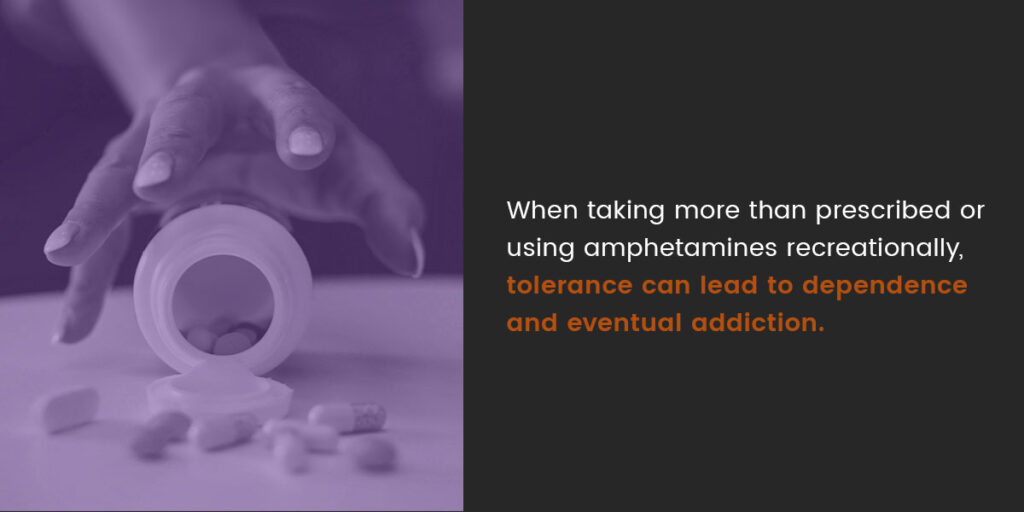Complete Guide to Amphetamine Addiction
In recent years, we’ve seen a significant increase in recreational amphetamine use and misuse in the U.S. While prescribed to treat conditions like attention-deficit hyperactivity disorder (ADHD) and narcolepsy, amphetamines are also taken for recreational and non-medical purposes. When misusing amphetamines or taking more than prescribed, these substances can be highly addictive.
Amphetamine addiction can cause serious long-term issues, including changes to the brain, malnutrition, cardiovascular damage, paranoia and anxiety. Learn how amphetamines work, the signs of amphetamine addiction and how to get help.
How Do Amphetamines Work?
Amphetamines are stimulants, meaning they speed messages traveling between the brain and the body. More specifically, they make the central nervous system work faster by increasing dopamine and serotonin levels — the feel-good chemicals in the brain. Amphetamines are prescribed for ADHD for their calming effect. The U.S. Food and Drug Administration (FDA) has also approved amphetamines to treat conditions like obesity and narcolepsy.
Immediate effects of amphetamines can include feeling alert, talkative, restless and excited. They can also cause fast heart rate and breathing, dry mouth, sweating and dilated pupils. When taken by mouth, these effects can be felt within 30 minutes and last many hours.
Types of Amphetamines
The FDA has approved many types of amphetamines and prescription stimulants, with brand names that include:
- Adderall®
- Vyvanse ®
- Concerta®
- Metadate®
- Ritalin®
- Dexedrine®
- Focalin®
- Methylin®
FDA-approved amphetamines come in different forms as well, including immediate-release tablets, extended-release capsules and oral solutions.
Signs and Symptoms of Amphetamine Addiction
Amphetamines are powerful stimulants that can cause immediate physical and behavioral effects. The body can quickly build up a tolerance, meaning you need more of the drug to achieve the initial effects. When taking more than prescribed or using amphetamines recreationally, tolerance can lead to dependence and eventual addiction.

You might seek professional treatment if you experience any of the following amphetamine addiction symptoms:
- Insomnia and sleep disturbances
- Increased blood pressure and heart rate
- Decreased appetite and weight loss
- Mood swings and aggression
- Paranoia, depression and anxiety
- Persistent drug-seeking behavior
- Increased risk-taking behavior
- Isolation and social withdrawal
- Secretive behavior
The earlier you recognize these signs, the better. The sooner a person can seek professional treatment for their addiction, the better chance they have of preventing the adverse health effects of amphetamine addiction.
Long-Term Effects of Amphetamine Addiction
Without professional treatment, amphetamine misuse and addiction can wreak havoc on the mind and body. The risks of long-term addiction include:
- Cardiovascular issues: With increased stimulation to the sympathetic nervous system, chronic amphetamine use can cause cardiovascular problems like hypertension, tachycardia and direct cardiac toxicity. These can lead to heart attack, stroke and heart failure, sometimes resulting in death.
- Malnutrition: Chronic amphetamine misuse or addiction can also lead to reduced appetite and unhealthy eating habits and then malnutrition. These changes can result in issues for the body and brain.
- Insomnia: Since amphetamines increase energy and suppress fatigue, long-term misuse can lead to insomnia and other sleep disturbances.
- Structural brain changes: The most significant dangers of amphetamines are the structural changes they can cause in the brain. One study found that amphetamines produce several chemicals that can negatively impact brain function, leading to neuroinflammation and neurotoxicity. It can fundamentally impact how the brain works, even affecting your ability to stop use and avoid relapse.
- Neurological disorders: Long-term amphetamine addiction can also lead to neurological disorders that could take years to recover from after receiving treatment. One study found chronic amphetamine use could lead to the development of depression, psychosis, generalized anxiety, memory loss, additional substance misuse and social dysfunction.
Amphetamine Addiction Statistics
In 2021, a general population survey found 36 million people used amphetamines worldwide, an increase from 34 million in 2020. Additionally, amphetamine accounted for 16% of global seizures from stimulants, and approximately 114 tonnes of amphetamines — combined weight of powder and tablets — were seized, suggesting a flourishing market.
High schoolers make up a large percentage of the increase in amphetamine use and misuse. Over 31% of those in 12th grade reported illicit amphetamine use in 2023. Students in schools with the highest rates of ADHD prescriptions had a 36% higher risk of misusing these stimulants.
Research has also reported a significant rise in overdose deaths among teens between 2010 and 2021 — primarily attributed to fentanyl, an illicit and potent synthetic drug contaminating prescription medications.
Amphetamine Addiction Treatment
Overcoming amphetamine addiction takes a comprehensive approach that addresses the physical and psychological aspects of the disorder. At The Sanctuary at Sedona, we take an integrative, holistic approach to treatment, considering your unique needs to create a personalized treatment plan. Treatment for amphetamine addiction can include:
- Detox protocol: The first step in treatment involves medically supervised detox to manage withdrawal symptoms as the substance leaves your body. That way, you are physically stable and ready for the subsequent phases of treatment.
- Evidence-based therapies: Evidence-based therapies like cognitive behavioral therapy (CBT) can help you identify and change negative thought patterns and behaviors associated with substance use. At the same time, support groups and group therapy can help you feel less alone and work toward recovery with people who have been through similar experiences.
- Medication-assisted treatment (MAT): In some cases, MAT can help you manage your withdrawal symptoms and reduce cravings to increase your chances of a successful recovery. A health care professional might prescribe medications like bupropion or naltrexone to help you through the treatment process. You might also be prescribed medications for co-occurring disorders like depression and anxiety if needed.
- Exercise and supplements: At The Sanctuary, we provide supplements through IV therapy and nutrition to help your body recover from the effects of addiction. We also promote a healthy exercise regimen that supports your brain and body health.
- Alternative therapies: We believe in a holistic, natural approach to help you recover from addiction. We also offer alternative therapies like breathwork, bodywork, nature ecotherapy, yoga and meditation. These therapies can help you be more mindful, improve your well-being and reduce stress during recovery.
Get Integrative Amphetamine Addiction Treatment at The Sanctuary at Sedona
 Amphetamine addiction is a complex condition with mental, physical and social health consequences. At The Sanctuary, we can help you overcome this dangerous cycle and get your life back on track. Our team of addiction specialists and health professionals will support you at every step of your recovery journey.
Amphetamine addiction is a complex condition with mental, physical and social health consequences. At The Sanctuary, we can help you overcome this dangerous cycle and get your life back on track. Our team of addiction specialists and health professionals will support you at every step of your recovery journey.
We offer integrative, holistic, science-backed treatment plans to help you heal and restore your health. To learn more about our treatment approach, request a call from us today.

